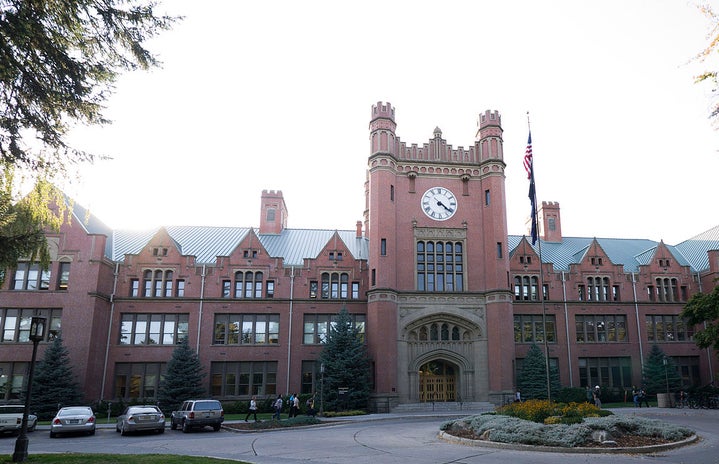Since the Supreme Court overturned Roe v. Wade in June 2022, abortion policy has been up to the individual states rather than being constitutionally protected nationwide. Because of this, reproductive health care access has become a hot-button issue on college campuses.
That’s especially true for schools in states with trigger bans that automatically outlawed abortions with that June decision in Dobbs v. Jackson Women’s Health Organization — states like Idaho. In fact, Idaho is now receiving national attention after the general counsel at the University of Idaho issued a memo saying the university should stop providing birth control for its students.
Wait, what’s up with this University of Idaho birth control ban?
According to The Washington Post, the memo warned university employees against distributing contraception to students, as well as speaking in support of abortion at work. Doing so, along with counseling or referring students who need abortions, could result in felony convictions or permanently prohibit them from state employment.
The email referred to the ban as a recommended “conservative approach” to interpreting the “unclear and untested” language of the state abortion ban — which went into effect on Aug. 25 — and how strictly it may be enforced.
Yikes. How are people reacting?
Abortion rights groups like Planned Parenthood have criticized the university’s guidance. Free speech groups also aren’t happy, according to USA Today, since they believe the restrictions on faculty members’ speech is a violation of the First Amendment. Press Secretary Karine Jean-Pierre also weighed in, tweeting, “[N]othing under Idaho law justifies the university’s decision to deny students access to contraception. But the situation in Idaho speaks to the unacceptable consequences of extreme abortion bans.”
News of the memo is already going viral on TikTok, with creators like feminist author Jessica Valenti bringing awareness to the university’s guidance. “This is how Republicans ban birth control: not all at once, but by chipping away,” Valenti wrote in the caption of her video explaining the ban. Valenti explained that under the ban, the university could still distribute external condoms, but only for the purpose of STI prevention — aka, not pregnancy prevention.
President Biden has also responded to the University of Idaho, calling on administrators at other colleges to keep distributing contraception to students. Speaking at a White House event on Oct. 4, he said, “I’ve asked Education Secretary [Miguel] Cardona to look at the steps that we can take to protect college students and school employees in Idaho or other states where their access to contraception is at risk.”
What does the ban mean for me? Is my school next?
This isn’t an easy situation, and I won’t pretend there isn’t some cause for concern here. Boise State University also reportedly told faculty members they could face felony charges for violating Idaho’s strict abortion laws, which prohibit school health centers from giving students emergency contraception, or even just telling them where to find it. Idaho has some of the most restrictive abortion laws in the country, according to the Center for Reproductive Rights, and other Idaho schools or schools in states with trigger bans could fall back on the “conservative approach” model that the University of Idaho is implementing.
As for whether this ban may spread to other colleges or universities, that remains to be seen. Abortion rights activists — and the American College Health Association — are worried about other colleges following the University of Idaho’s lead, according to news site Axios. On the other hand, many school administrators have already spoken out about protecting students’ access to contraception. According to The Washington Post, officials at schools like the University of Michigan and Vanderbilt University have already made strides to support reproductive healthcare access for students.
The Biden administration also announced that over $6 million would be provided for new Title IX grants and other grants meant to protect reproductive healthcare access, per The Hill, and the Department of Education will be releasing guidance to universities nationwide that emphasizes Title IX, which holds that students must be protected against discrimination based on pregnancy and pregnancy termination.
For students currently at the University of Idaho, the memo clarified, “Counseling on birth control, as well as providing the means for birth control, can be done through the licensed physicians and their health care workers at Student Health locations run by Moscow Family Medicine, our Student Health provider.” Moscow Family Medicine is not associated with the university, according to Axios.
If you are concerned that your school may ban birth control, you do have options to get contraception now. If you’re on a parent or guardian’s health insurance rather than your school’s, you can get birth control pills from a doctor outside of your school health center. Students can also go to their local Planned Parenthood to get a prescription for birth control pills, or even online through PP Direct in select states (including Idaho). If you need emergency contraception like morning-after pills, you can buy them over the counter at most drug stores, grocery stores, and Planned Parenthood centers without a prescription.
When speaking about the University of Idaho’s memo, Biden asked, “What century are we in?” College students across the country seem to be asking the same question — a lot of work needs to be done in order to protect students’ reproductive rights.


